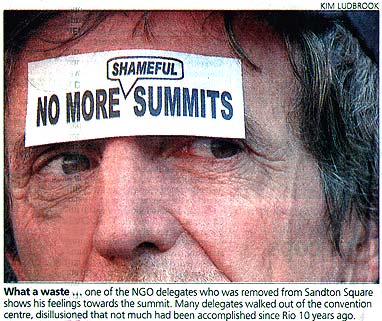|
Blueprint
to save the Earth
September 04 2002 at 09:41PM
This is a summary of some of the goals and targets in the plan, which is designed to make a reality the World Summit's goals of poverty eradication and environmental protection. Each goal has been assessed by a team of Independent Newspapers in Johannesburg and London, according to the following key:
RATING: 5 Agreement:
How it was reached: The main opposition to this commitment came from the United States, but, as the week went on, it became more and more isolated, with allies on other contentious issues - like the Opec countries, Canada, Japan and even the big business lobby - calling for the target to be agreed. In the end the US was forced to give in. The deal was welcomed by many development charities as marking an important step towards preventing more than 2-million deaths a year from diseases caused by people drinking dirty water. It completes plans laid out in the United Nations' 2000 Millennium Declaration to halve, by 2015, the number of people - more than a billion - who are unable to reach, or afford, safe drinking water. Will it make a difference? Yes, if nations act now to implement what they have promised to do. It could drastically cut the number of people, mainly children, who die because they drink polluted water. HEALTH
RATING: 3 Agreements:
How it was reached: The sticking point was the issue of women's reproductive rights, particularly a paragraph calling for better health services "consistent with national laws and cultural and religious values". Some countries feared the wording could endorse the practice of genital mutilation. Eventually the summit compromised on a text on women's reproductive health which satisfied concerns that it was a human right but could not be interpreted as promoting abortion. Will it make a difference? The patents clause is key because of the unaffordability of Aids drugs. This is an issue over which South Africa went to court. Other agreements:
AGRICULTURE AND FISHING
RATING: 5 The agreements:
How it was reached: The first significant deal of the summit. It means all countries will be responsible for reversing declines in fish stocks or maintaining them at a healthy level. But environmentalists said the deal was a classic example of "too little, too late". Fish stocks worldwide are in crisis, with more than 70 percent of commercially important stocks either over-exploited, depleted, or close to the maximum sustainable level of exploitation. Consumption of fish has increased by 240 percent since 1960. Will it make a difference? It could do. But the wording of the agreement is not particularly strong, and many fishing nations have so far strongly resisted tough controls. Other agreements:
RATING: 4 Agreement:
How it was reached: Environmentalists were dismayed at the wording, which is less strong than a resolution agreed at an international conference in April. The new, non-binding proposal is aimed at curbing the destruction of habitats such as rainforests, wetlands and coral reefs, which is driving animal and plant species to extinction. The target was set despite resistance from the US and the G77 group of developing countries, but remains weak and largely meaningless. Will it make a difference? Precious little in itself. There is nothing here but a vague and weak aspiration - and no concrete measures to make sure that the extinctions are actually slowed. Other agreements:
POVERTY
RATING: 3 The agreements:
How it was reached: The over-arching aim of the summit was to bridge the income gap between the world's richest and poorest, while ensuring the environment is not harmed in the process. But the sprawling agenda and divergent interests meant there were compromises aplenty in the summit agreement, some of which were attacked by civic and environmental groups as significant steps backward from previous commitments. Will it make a difference? Not a lot. The real goal - to halve dire poverty by 2015 - were decided by the Millennium Summit two years ago. The test will be whether countries meet them. Other agreements:
ENERGY
RATING: 2 Agreement:
How it was reached: The summit failed to set any targets for increasing renewable energy, thus falling short of one of the most important yardsticks for success. It agreed to phase out harmful subsidies "where appropriate", but included passages boosting nuclear power and fossil fuels that cause global warming. Attempts to increase the rate of renewable energy were stymied by opposition from the world's major oil producers and biggest oil consumer, the US. Ratifications to the Kyoto Protocol on climate change increased, and the agreed summit text says nations that have ratified Kyoto "strongly urge" the other states to ratify it in "a timely manner". Will it make a difference? Not really, and could make things worse. But some developing countries said they would press ahead with renewable energy anyway. Other agreement:
|
Email this page to a friend
If you speak another language fluently and you liked this page, make
a contribution by translating
it! For additional translations check out FreeTranslation.com
(Voor vertaling van Engels tot Nederlands)
(For oversettelse fra Engelsk til Norsk)
(Для дополнительных
переводов проверяют
FreeTranslation.com )


